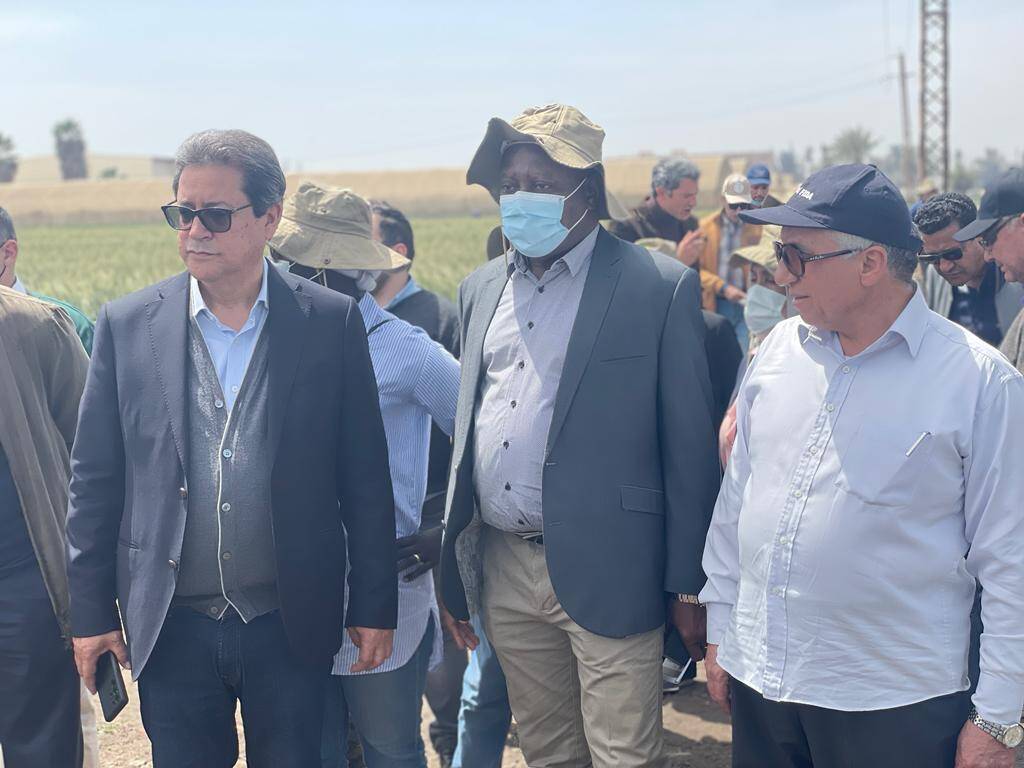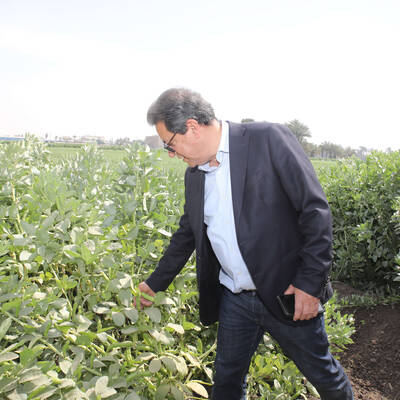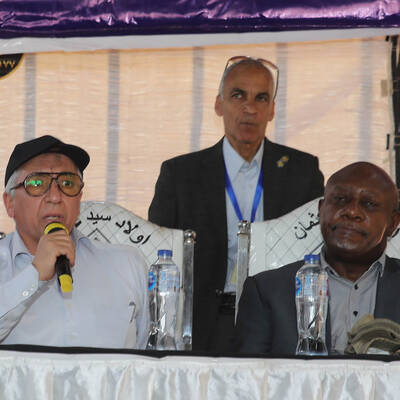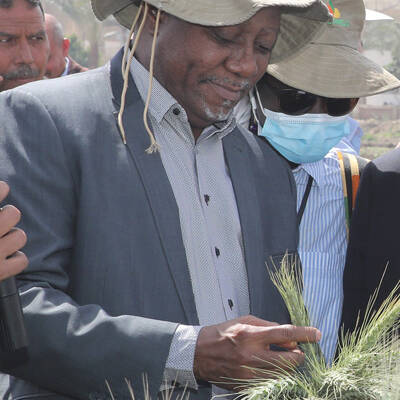Improved crop varieties can help mitigate rising grain prices

It is thanks to the support of the Deutsche Gesellschaft für Internationale Zusammenarbeit (GIZ), the Grains Research and Development Corporation (GRDC), the CGIAR Research Program on Grain Legumes and Dryland Cereals (CRP-GLDC), and our partners the Egyptian Agricultural Research Center (ARC) that this work is made possible.
Beni Suef, Egypt, March 30.
At the recent ARC Sids Crop Research Station Field Day, Mr. Aly Abousabaa, CGIAR Regional Director of Central and West Asia and North Africa, and ICARDA Director-General met with Dr. Mohamed Soliman, President of the Agricultural Research Center, Egypt, and Dr. Harold Roy-Macauley, AfricaRice Director General to review the latest climate-smart crops innovations and discuss specific food/nutrition needs & market demand in the region.
Each year in March, ICARDA and Egypt's Agricultural Research Center (ARC) invite leading scientists, agronomists, experts, and farmers to the ARC Sids Crop Research station field day to demonstrate new high yield varieties of the strategic crops (wheat, beans, barley, and chickpea) that are resistant to biotic and abiotic stresses in addition to the innovations in crop breeding and irrigation systems.

During the last six years, Egypt’s ICARDA/Agricultural Genetic Engineering Research Institute research center led by ICARDA/CGIAR's crops breeders, has carried out research on wheat, barley chickpea, faba bean, and lentils, focusing on disease resistance as well as climate-smart traits such as drought, heat, and salinity. With the new varieties, dryland farmers have been able to grow crops resistant to biotic and abiotic stresses, achieving higher stable grain yield, reducing the cost of inputs, and improving profitability for growers.

“Developing other crops such as barley and legumes doesn't mean taking resources away from wheat. But we need to strengthen staple alternatives given the current global grain pressures. These improved alternatives can also be grown in areas where wheat doesn’t fare well to further boost incomes,”
- Mr. Aly Abousabaa, CGIAR Regional Director of Central and West Asia and North Africa, and Director General of ICARDA.
Given the impacts of climate change on the country and region, as well as the effects of the current conflict in Eastern Europe. high-yielding, resilient, heat- and drought-adapted varieties can help reduce the food gap of diverse crops and lower dependence on imports.
Dr. Aladdin Hamwieh, ICARDA-EGYPT Country Manager, reiterates CGIAR crops' journey from the genebank in Lebanon all the way to our crop research stations in Egypt (Video is in Arabic)
As the supply of grains rapidly drops across Africa, Asia, and the Middle East due to the crisis in Eastern Europe, CGIAR and key partners like ARC-Egypt are urgently addressing growing climatic challenges, pests, and diseases that hinder domestic production, as well as offering alternatives to imported staples.

"Egypt's priority is to extensively expand wheat production in the next year. A high percentage of our wheat is imported. With the prices increase, more wheat production is crucial for our food security,”
Dr. Mohamed Soliman, President of the Agricultural Research Center (ARC), Egypt.
CGIAR researches crop diversification between staple crops such as wheat, with protein and micro-nutrient rich crops such as legumes, which also improve soil fertility and health through nitrogen fixation. Legumes have a low carbon footprint which aids climate change mitigation, and when incorporated into crop rotations, can improve the sustainability of farming systems. CGIAR research also indicates that the crop can be a significant contributor to incomes at household level, and, as with barley, if scaled up properly can provide a viable alternative to wheat.

“It is impressive to see how crops are performing well in this area in Egypt. This research being done is crucial for Egypt’s food and nutrition security as well as directing Egypt towards self-sufficiency and being less dependent on imports,”
Dr. Harold Roy-Macauley, Director-General of AfricaRice.
Egypt consumes 18 million tons of wheat per year and has a wheat storage capacity of 6.5 million tons. The ministry of agriculture is expecting to harvest 10 million tons of wheat this season compared to 3.6 million tons previously.
By generating an effective crop-breeding strategy and new crop varieties, alongside the training, technologies, and tools needed, farmers can grow new crops that flourish, and challenges in food and nutrition security can be better addressed.



